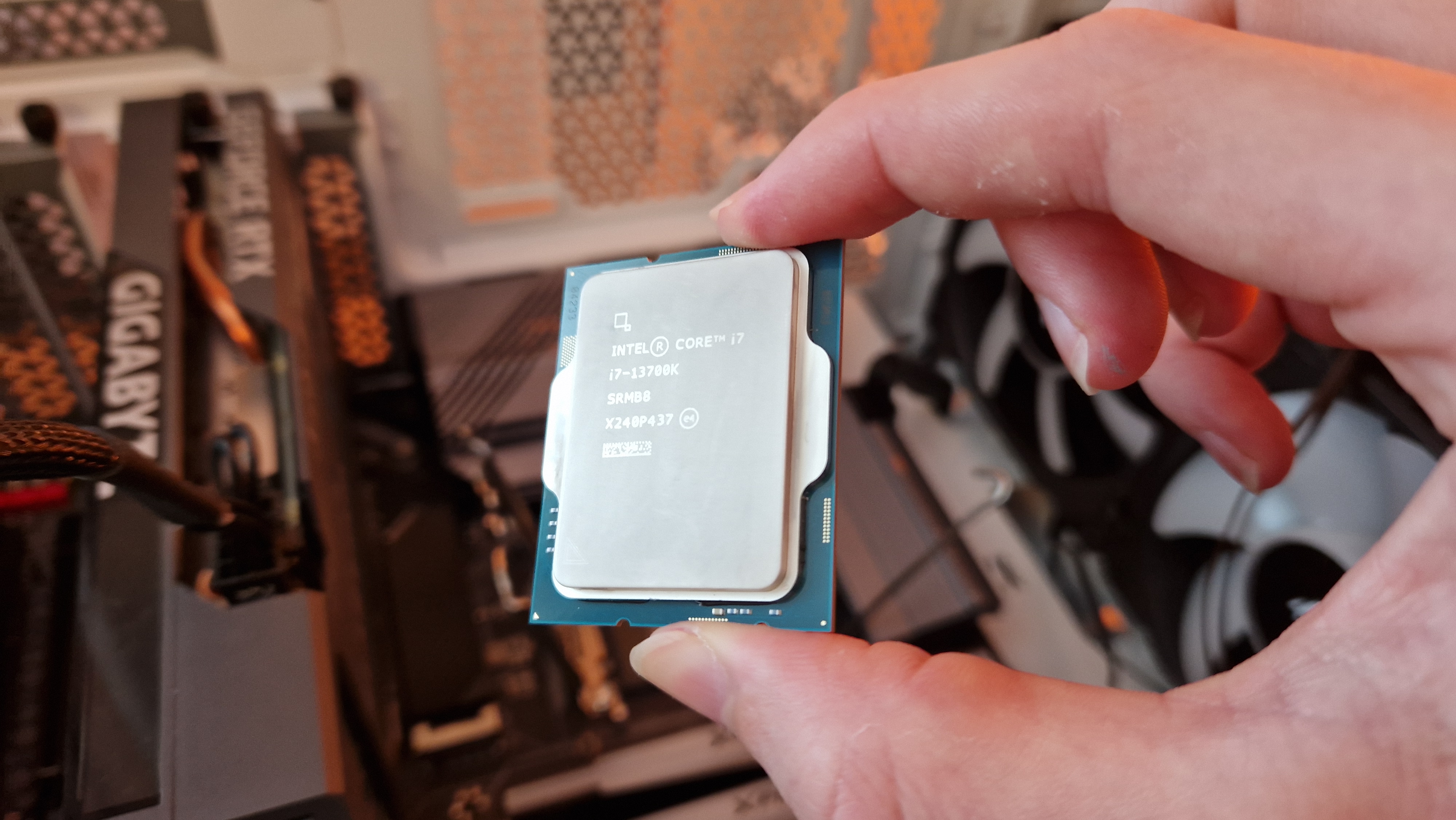GamesRadar+ Verdict
The 13th Gen Intel Core i7 is a powerhouse of a CPU. Like all 13th Gen processors, it's power-hungry and takes some temperature management. I'd still argue the 13600K is all gamers really need, but for those who want that extra headroom, the i7 gets you last-gen i9 power and a lot of peace of mind.
Pros
- +
Noticeable boost over i5-13600K
- +
Extremely capable performance for gaming and work
Cons
- -
Current Ryzen 7 is cheaper
- -
i5-13600K is still all most folks need
- -
Power-hungry
- -
Prone to high temperatures
Why you can trust GamesRadar+
As I sit down to review the 13th Gen Intel Core i7-13700K, Intel's 2023 Innovation conference is being held in San Jose. While we haven't yet heard anything about the "Raptor Lake Refresh" wave of desktop processors that's slated to release before the end of the year, I can't help but wonder if it'll help or hurt the current i7.
The i7-13700K is coming up on its first birthday, but its price has remained pretty stubborn. With Black Friday on the horizon and a refreshed set of Intel CPUs set to arrive soon though, we can only hope that Intel's current best CPUs for gaming start to get cheaper. After all, AMD managed to scoop up so much of the market by pricing things more fairly, along with finding some excellent performance.
A new i7 that's rumored to gain about a 3-5% performance boost will no doubt drive the price of the current model down, but what if the performance boost is more substantial? And what if Intel embraces the undercutting strategy and chooses to make its next chips more affordable? Intel's new Meteor Lake architecture for mobile processors seems to point to a bold new direction for the brand, so it isn't impossible that a newer model makes this little i7 feel redundant.
For circa $400 /£390, a 13700K might not be a tempting prospect if you're looking to upgrade from an older-generation mid-ranger. If you're finally getting around to a DDR5 gaming PC, or you're comparing prices with AMD, this poor i7 - as powerful as it is - isn't the belle of the ball. When you then take into account how great a 13th Gen i5 is for cheaper, it's actually quite difficult to know who to recommend a 13700K to at the moment.
That feels like a bizarre thing to say, because this CPU is a total powerhouse.
Specs and Features
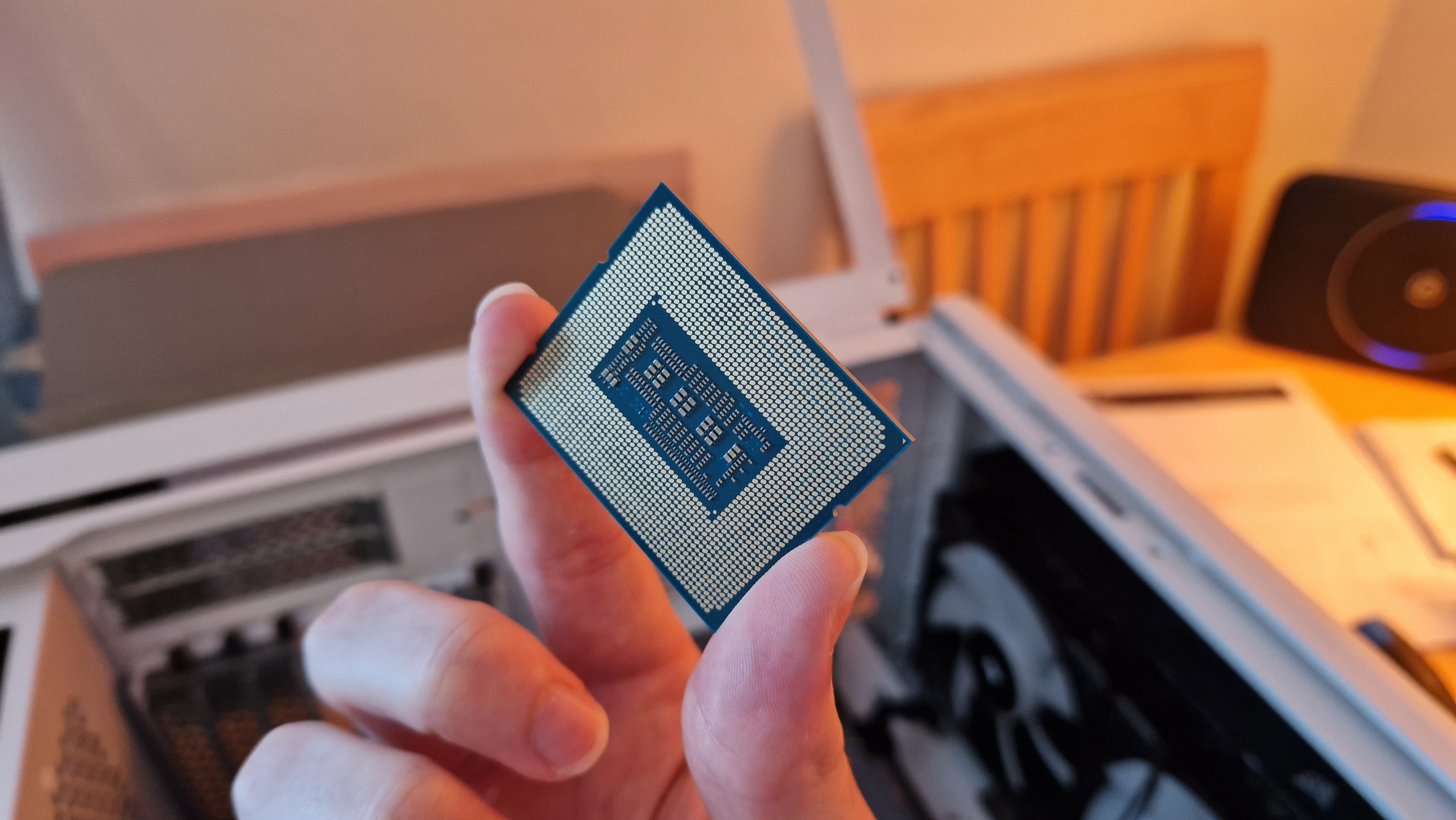
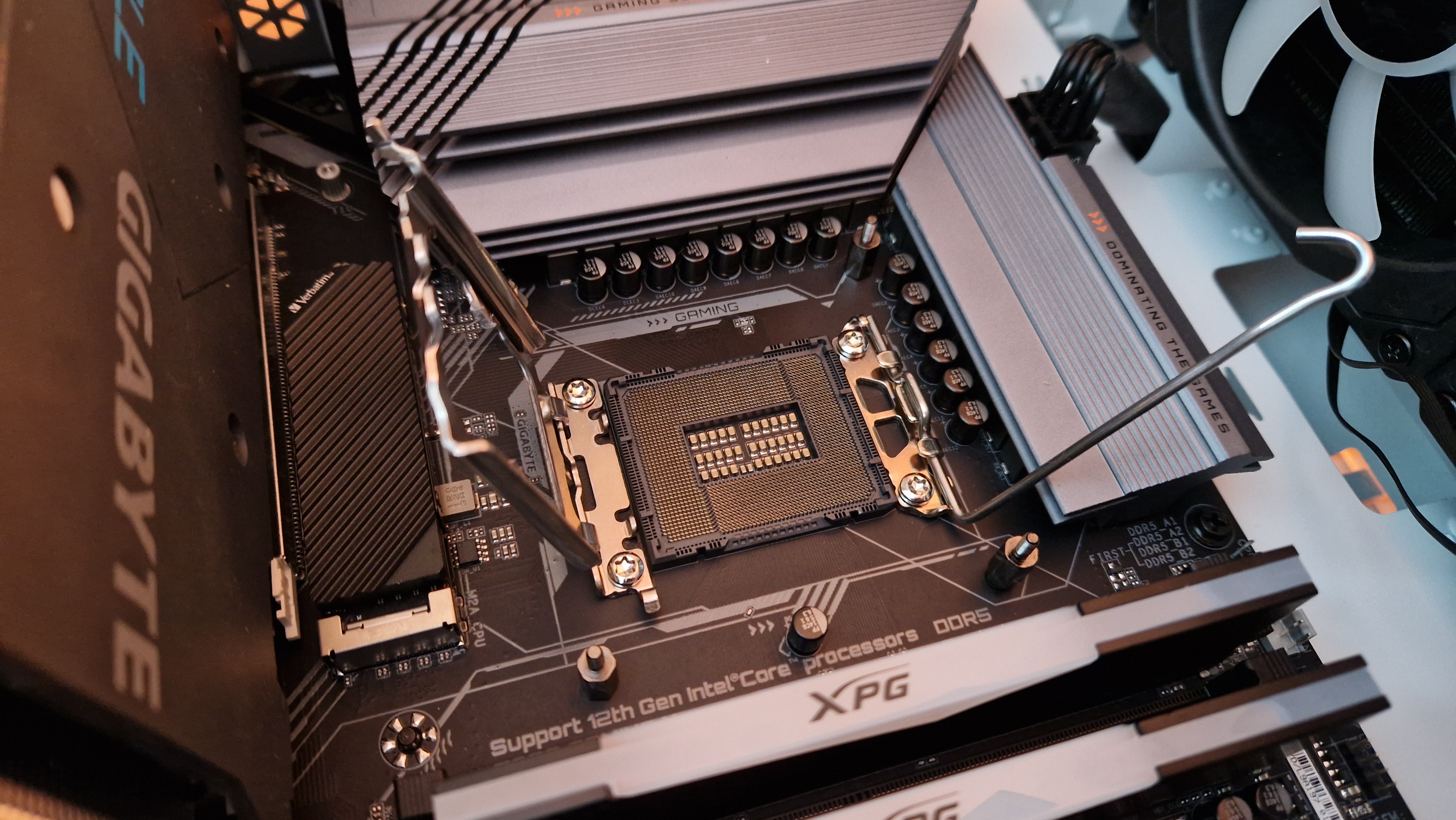
I won't dwell on the aesthetics of the 13th Gen i7, because there just isn't much to talk about. The handy gold triangle is in the bottom left corner to assist you with installation, and the appropriate socket for this chip is the LGA1700. That means if you're coming from any of the 12th Gen chips, you're not going to need a new motherboard, but anything older, and you'll need to search for the beginnings of a new rig.
The 13700K has 16 cores - only two more than the i5. These are made up of 8 performance cores and 8 efficiency cores. In terms of threads running through these cores, you have 24 - four more than the i5.
If you're not clued up on what those things actually are (which is totally fine, the world of CPU architecture is very capable of making brains itch), I'll use my go-to analogy. Picture a factory with 16 workers manning 24 conveyor belts of products going in and out. If the workers are cores and their conveyors threads, it essentially means those workers have so many routes to ship out their newly made products and it's highly, highly unlikely that any of those conveyor belts are going to get jammed up. Even if one does, there are 23 others to use.
Launch date: October 2022
Core Count: 16
Threads: 24
L3 Cache: 300
Base Clock: 3.4GHz
Boost Clock: 5.4GHz
Max recommended RAM speed: 6500MHz (5600MHz officially)
Integrated graphics: Yes, Intel UHD Graphics 770
Motherboard socket: LGA1700
Launch price: $409
GR+'s recommended GPU pairing: RTX 4070 Ti / AMD Radeon RX 7900 XT
I think the performance boosts below should be the main factor you use to decide, but it's worth noting that for the almost $100 price bump from the i5, you're only getting two more cores and four more threads here. To me, that isn't too much extra headroom for the money, but then again the latest i5 is a little beast.
One thing this i7 has gotten a lot of praise for is its ability to cater to both DDR4 and DDR5, so even if you don't have the best RAM for gaming on the market, this CPU is still going to be viable to you. Another bonus is that you'll also get a fancy 13th Gen feature called Turbo Max 3.0, which identifies your processor's more efficient cores and goes to them first when you're giving it lots to deal with.
The 13700K does have integrated graphics, which you can tell by the slightly confusing serial numbers Intel uses. Intel does have a new naming convention we're bound to start using later in the year, but for older chips, if you see a "K" at the end of the serial number, it has integrated graphics and an unlocked multiplier for overclocking. If you go for a cheaper version with a "KF" at the end of it, you won't get any integrated graphics, although you will get the multiplier. I haven't tested the integrated graphics on board here, but if it's heavy PC gaming you plan to do, we'd always recommend one of the best graphics cards anyway.
Performance
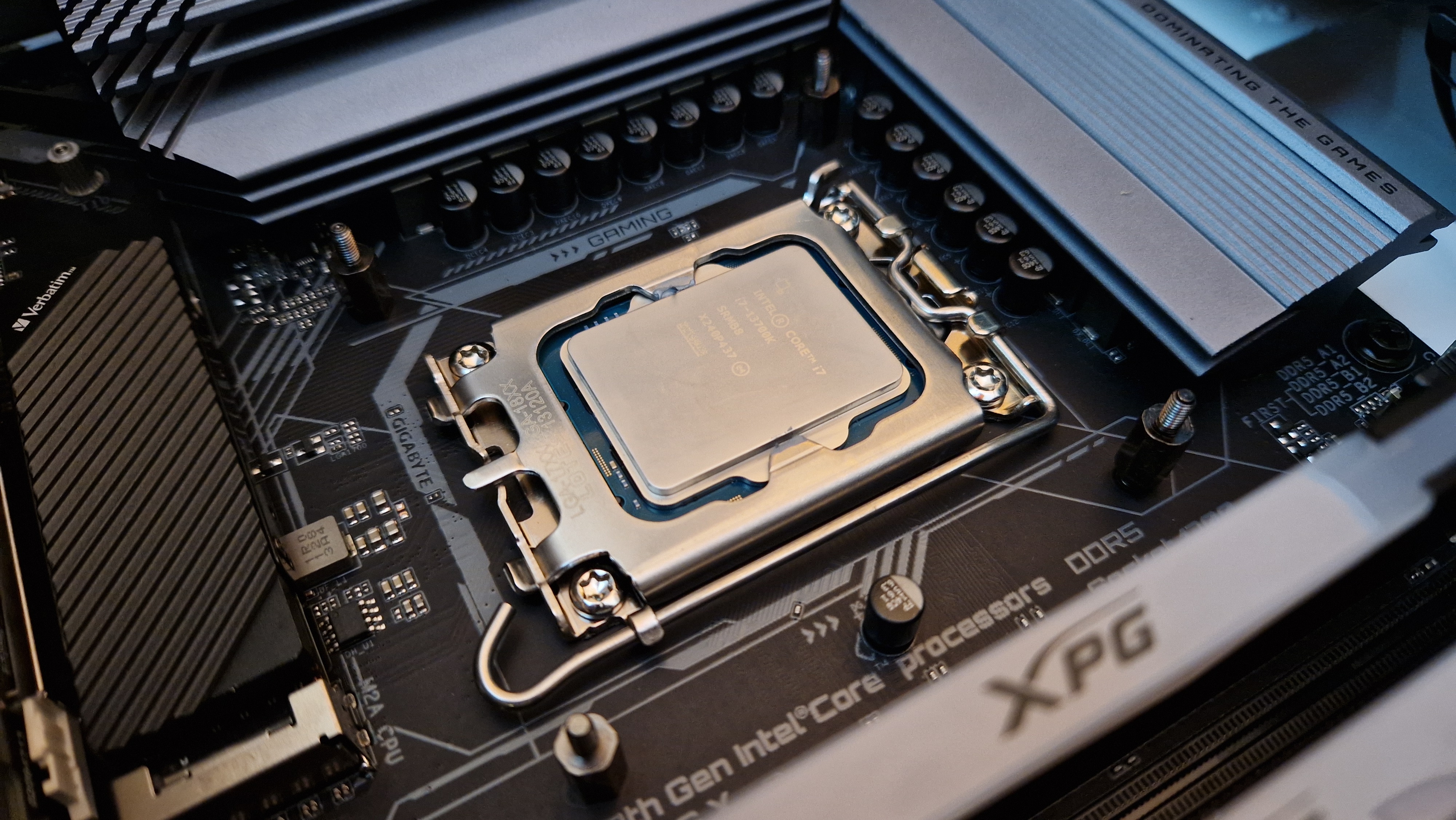
The 13th Gen i7 is now our testing rig's processor after we upgraded from the 12th Gen i7. That means I've been using it for RAM testing for the last few months, as well as benchmarking for the best SSDs for gaming and days of general work on it. As you might expect, I haven't run into any trouble while using it.
CPU Cooler: Elite Capellix AIO CPU Cooler
CPU thermal paste used: Prilima tech PK-3 high-grade thermal compound
Chassis: Corsair iCUE 5000T RGB
Number of fans: Six
GPU: RTX 3050
RAM: XPG RGB DDR5
Motherboard: Gigabyte Z690 Gaming X motherboard
I mean what I said in my review of the 13th Gen i5 - for the majority of people these days, an i7 or an i9 is overdoing it. Even if you have 40 Chrome tabs open while you work, you're running a VPN, doing content creation, and have music playing in the background, an i5 can handle all of that without losing its breath. As you can imagine, the extra allowance of cores and threads you have in the i7 gives you that bit of extra headroom, but in my eyes, the i7 didn't feel any faster than the i5 during general work and productivity.
But of course, we aren't just reviewing this processor as something for general work. Gaming efficiency will be the top priority for most of you reading, so let me put this simply: the 13700K is an excellent CPU for gaming, and you're not going to run into any bottlenecks with this in your rig, even if you're running an RTX 4090 or AMD Radeon RX 7900XTX. But as you'll hear me repeat throughout this review, the same goes for a 13600K.
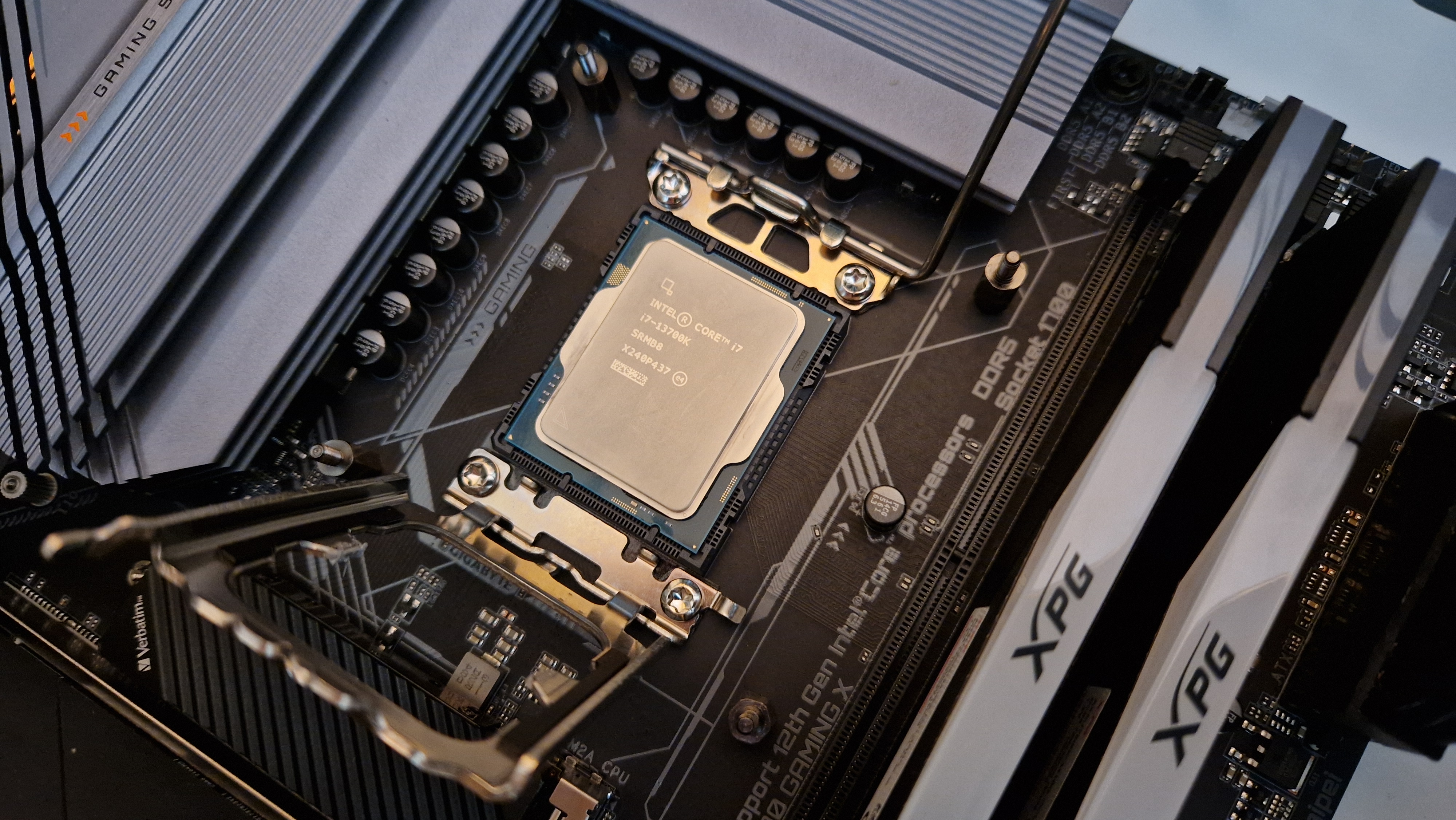
Hell, my colleague Phil has been running a 12th Gen i5 for a while now, even when testing the 4090, the 4080, and every other GPU they can get their hands on. You just aren't going to run into performance troubles with a modern i5, which almost spits in the face of the more noticeable boosts you'll see from this i7 in the tables below.
Our go-to testing games for CPUs are things that will give them lots of simulation work to keep track of. Games like Cities Skylines and Total War Warhammer 3 do just that, so here are some performance stats with those games running at 1080p, ultra settings. Our GPU here is our testing rig's RTX 3050. While the GPU we used in the i5 tests (Acer's Predator Intel Arc A770) had a much beefier 16GB of VRAM, the more powerful processor had a little less help here with 8GB.
In Total War, we used the game's included benchmarking tests, and with Cities Skylines we tracked metrics in some of the most heavily populated community scenarios.
| Row 0 - Cell 0 | Campaign Benchmark | Battle Benchmark | Mirrors of Madness Benchmark |
| Peak Temp | 53°C | 60°C | 61°C |
| CPU Voltage | 1.31V | 1.33V | 1.33V |
| Average FPS | 75fps | 102fps | 70fps |
| Peak percentage used | 5% | 4% | 3% |
| Row 0 - Cell 0 | Belmont City Transport Scenario | Paradise Coast Traffic Scenario | Presidente Los Santos |
| Peak Temp | 55°C | 61°C | 61°C |
| CPU Voltage | 1.32V | 1.31V | 1.33V |
| Average FPS | 101fps | 110fps | 62fps |
| Peak percentage used | 4% | 4% | 4% |
Comparing these to our benchmarks with the 13600K, you will be able to notice some wins for the i7. Keep in mind though, that these CPUs were tested in different rigs, so our figures won't give you a direct comparison. Regardless, it's plain to see that there are consistently higher numbers with the i7. I'll let you decide if they're high enough to warrant nearly an extra $100 on your purchase, however. The biggest leaps here come from Total War's benchmarking frame rates, with the i7 and RTX 3050 combo scoring consistently higher numbers, particularly with the Mirrors of Madness test.
What's quite surprising to me is that the i5 was hotter than the i7 during these in-game tests, reaching a maximum peak of 61 degrees across both games. This could be due to the AIO cooler we have in our testing PC completely outgunning the airflow of my Corsair 2000D Airflow RGB chassis - this is likely given my build is a small-form-factor one. Particularly when it comes to voltages, the i7 is noticeably higher across the board, with the i5's peak voltage reading under 1.29, and the i7 comfortably sitting over the 1.30 mark.
Something I think bolsters my argument that the i5 is better value is the percentage of CPU usage during these tests. Yes, the i5 did reach a peak of 12% use when running Total War's campaign benchmark, which is trounced by the i7's peak of 5% in the same test. Personally, I think both processors are ridiculous in this regard - Total War's benchmarks are designed to make components sweat, and for either to not go above 15% shows you just what type of technology we're dealing with here.
I would like to add though, that a peak of 12% is still utterly ludicrous. Yes, a peak of 5% is better (there's no denying that) but again, is 12% usage really going to convince you to spend that extra money?
Cinebench Multicore: 29,113 pts | 99°C
Cinebench Single Core: 2024 pts | 77°C
Blender Monster: 193.916 spm | 92°C
Blender Junkshop: 124.976 spm | 92°C
Blender Classroom: 93.542 | 98°C
(pts = "points", spm = "samples per minute")
With industry-standard benchmarking, the story is much the same, although my god I hope you're ready for i9 temperatures. When I reviewed the Acer Predator Orion 7000 (2023), I was shocked to see the unlocked i9 reach actual boiling point so often. I accepted it though, because it was an i9. Smash cut to benchmarking this 13700K, and I was gobsmacked to see our testing rig not able to keep its temperatures down.
For these, forget what I said about the i5's temperatures during in-game tests. The 13600K didn't break 90°C in these, but the i7 was pushing 100°C consistently. Now, you're hardly ever going to find games or content creation tasks that will put your CPU under as much pressure as Cinebench and Blender, and with an ambient temperature of around 40°C, I wouldn't say it's anything to worry about. On the other hand, if efficiency is a priority for you and you don't want a component upgrade contributing to higher energy bills, it's yet another reason to pull the trigger on the i5 instead.
Should you buy the Intel Core i7 13700K?
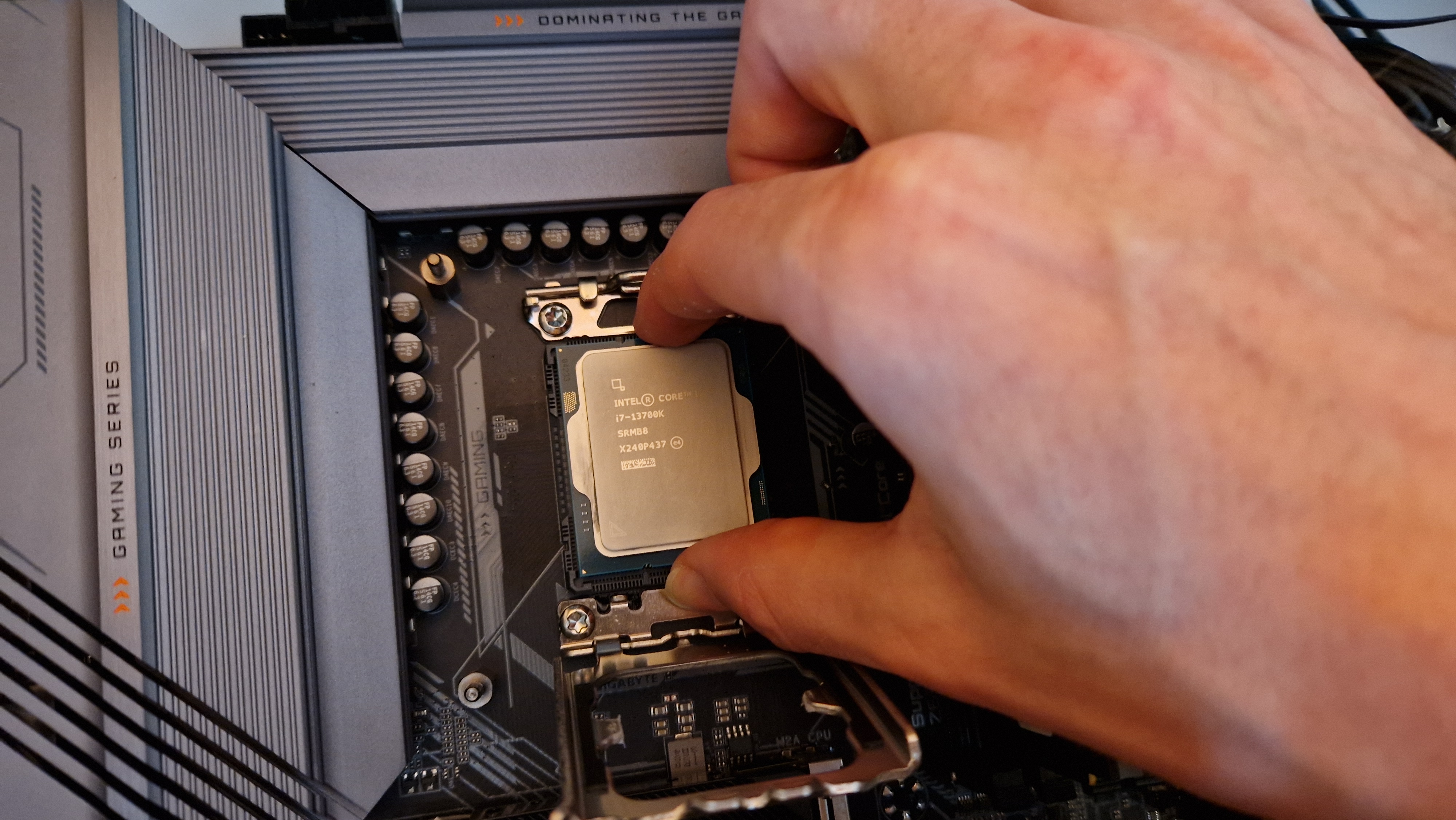
Overall, performance from the 13th Gen Intel Core i7 is excellent. If you can put up with higher voltages and have both the build and the coolers to manage its temperatures, you're going to be fine. In gaming, you're getting a CPU that's capable of playing anything contemporary here, and you aren't ever going to need to worry about bottlenecks with other components, particularly high-end GPUs.
Here's the catch: you can apply all of those statements to the i5-13600K, still get a top-notch CPU for your desktop, and spend less money. There's extra headroom to be had with the i7, but do you really need it? More importantly, is the extra headroom worth the money?
I started this review off by saying I wasn't sure who to recommend the i7-13700K to, but to finish, let me flip that statement on its head. This is a processor that's easy to recommend to anyone because it's brilliant, but I think anyone considering it should think really carefully about whether or not they'll actually need it.
If you're a streamer, content creator, 3D artist, or anyone else who needs that extra headroom for efficiency, creativity, or work, then sure - go for the i7. If you're a gamer looking for something to carry you through the next 3 to 5 years of new titles, an i5 is all you'll need.
How we tested the 13th Gen Intel Core i7-13700K
The 13th Gen Intel Core i7 has been our testing rig's CPU for the past few months. It's carried me through plenty of RAM and SSD testing in that time and has been used in plenty of gaming and productivity sessions.
For this review, I used Cinebench, Blender, and ICUE software to take industry-standard benchmarking figures and record metrics for evaluation. In terms of gaming, I used Total War Warhammer III's benchmarking tests, as well as some of the most strenuous scenarios made by the Cities Skylines community. I've also tested this CPU's clock speeds by doing RAM tests with it, playing around with XMP profiles, and mostly running at 6000MHz and above.
For more on the ways we test the latest PC components, take a look at our Hardware Policy.
For more on gaming PC hardware, check out our thoughts on the best Alienware gaming PCs, the best PC cases, and the best computer speakers.
One of my earliest memories is playing SuperMario64 and wondering why the controller I held had three grips, but I only had two hands. Ever since I've been in love with video games and their technology. After graduating from Edinburgh Napier University with a degree in Journalism, I contributed to the Scottish Games Network and completed an Editorial Internship at Expert Reviews. Over the last decade, I’ve been managing my own YouTube channel about my love of games too. These days, I'm one of the resident hardware nerds at GamesRadar+, and I take the lead on our coverage of gaming PCs, VR, controllers, gaming chairs, and content creation gear. Now, I better stop myself here before I get talking about my favourite games like HUNT: Showdown, Dishonored, and Towerfall Ascension. Location: UK Remote
